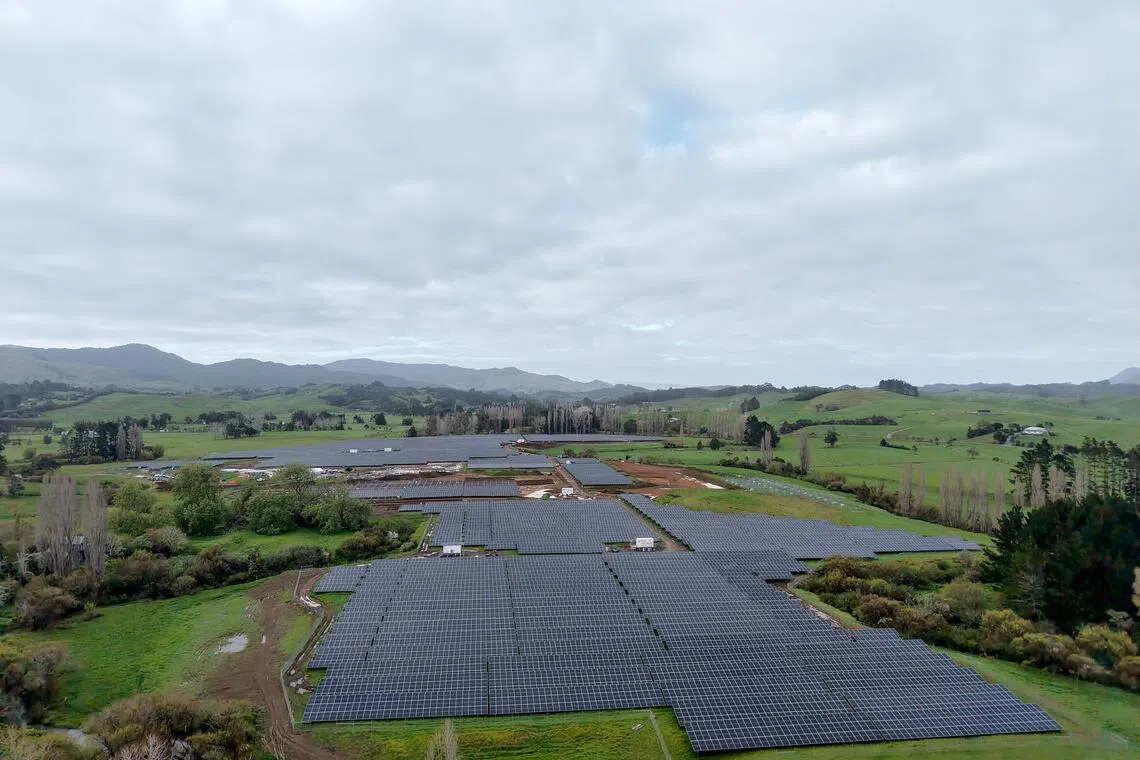Singapore investor sees sunny returns in New Zealand solar projects
Sign up now: Get insights on Asia's fast-moving developments

SC Oscar’s Twin Rivers solar power project near Kaitaia, on the northern tip of New Zealand’s North Island.
PHOTO: THOMAS SCHENKELS
- SC Oscar, a Singaporean renewable energy investor, sees great potential for solar power growth in New Zealand due to its low solar penetration.
- SC Oscar, via Ranui Generation, has three solar projects in development, including the Twin Rivers project which will power 6,000 homes.
- Driven by rising electricity demand, New Zealand aims for up to 98.3% renewable energy by 2050, with significant increases in solar and wind.
AI generated
SINGAPORE - A Singapore-based renewable energy investor sees a bright future in solar power in New Zealand, where only about 1 per cent of the nation’s electricity is powered by the sun.
That means there is plenty of room to expand and potential to tap the growing future energy demand, said Mr Conor McCoole, chief executive and co-founder of Singapore-based SC Oscar Fund Management.
SC Oscar, via its portfolio company Ranui Generation, already has three large-scale solar power plants at advanced stages of development. One of these – the Twin Rivers project near Kaitaia on the far northern tip of the North Island – recently started feeding power into the grid. The 31 megawatt-peak (MWp) project, when fully commissioned in December, will be able to power 6,000 homes.
SC Oscar hopes to commence construction of the other two solar projects in the Taranaki region of the North Island in the first quarter of 2026.
“It is rare to find an AA+ rated OECD (Organisation for Economic Cooperation and Development) country with very low solar penetration, a stable competitive electricity market and strong power demand growth prospects,” Mr McCoole said. He was speaking to The Straits Times ahead of Singapore Prime Minister Lawrence Wong’s Oct 9 to 11 visit to New Zealand.
In total, SC Oscar, via its SC Renewable Energy Plus Fund, plans to invest NZ$154 million (S$115 million) in the initial three solar projects, which will have a capacity of 108MWp. A fourth project is also planned.
Ranui Generation, which was acquired by SC Oscar in 2024, is developing the projects.
“As a fund, we seek to own 100 per cent of the solar projects, including the land. New Zealand ticks all these boxes,” Mr McCoole said.
The target of the SC Renewable Energy Plus Fund is to raise US$300 million (S$389 million) in commitments, including co-investment capital. The fund is open to accredited investors and will close in June 2026. Mr McCoole declined to say how much has been raised to date.
According to a 2024 study by New Zealand’s Ministry of Business, Innovation and Employment, electricity demand could increase by up to 82 per cent by 2050 from 2023 consumption levels, driven by greater electrification, industrial and commercial demand, electric vehicles and data centres.
In the most ambitious scenario, renewable energy’s share of electricity generation could reach 98.3 per cent, from about 85 per cent now. Greater investments in wind and solar are key to achieving this. Currently, the country’s primary renewable energy sources are hydropower and geothermal energy.
Even under a more modest baseline reference scenario, which considers current trends and anticipated changes, solar rises to 11.3 per cent and wind 20.7 per cent (currently about 9 per cent) by 2050. Hydropower, currently about 55 per cent, falls to about 42 per cent.
SC Oscar has also invested in a wood pellet development company that will use timber harvest residues and logs from New Zealand’s pine forest plantations. Pellets provide an alternative to coal and gas to help local industries switch away from fossil fuels, said SC Oscar’s managing partner Antony Warren.
The intention is to develop multiple wood pellet production projects to supply domestic industrial buyers.
The fund manager is also looking at battery energy storage systems for solar power in Australia, a country currently phasing out its ageing coal power plants, which supply about 50 per cent of its power.
“This offers one of the biggest decarbonisation investment opportunities in Asia in the next decade,” Mr McCoole said.
SC Oscar is owned 60 per cent by SC Capital Partners, a Singapore-based real estate private equity investor, in which CapitaLand Investment became a 40 per cent shareholder in March. The remainder is held by Mr McCoole, Mr Warren and other private investors.



